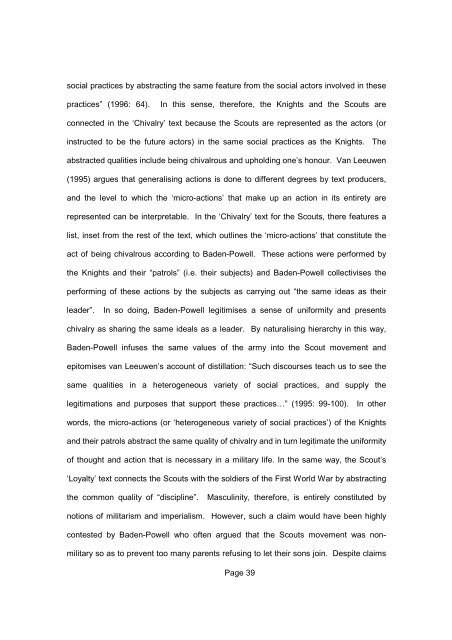A Discussion of the Representation of Masculinity and Femininity in ...
A Discussion of the Representation of Masculinity and Femininity in ...
A Discussion of the Representation of Masculinity and Femininity in ...
Create successful ePaper yourself
Turn your PDF publications into a flip-book with our unique Google optimized e-Paper software.
social practices by abstract<strong>in</strong>g <strong>the</strong> same feature from <strong>the</strong> social actors <strong>in</strong>volved <strong>in</strong> <strong>the</strong>se<br />
practices” (1996: 64). In this sense, <strong>the</strong>refore, <strong>the</strong> Knights <strong>and</strong> <strong>the</strong> Scouts are<br />
connected <strong>in</strong> <strong>the</strong> ‘Chivalry’ text because <strong>the</strong> Scouts are represented as <strong>the</strong> actors (or<br />
<strong>in</strong>structed to be <strong>the</strong> future actors) <strong>in</strong> <strong>the</strong> same social practices as <strong>the</strong> Knights. The<br />
abstracted qualities <strong>in</strong>clude be<strong>in</strong>g chivalrous <strong>and</strong> uphold<strong>in</strong>g one’s honour. Van Leeuwen<br />
(1995) argues that generalis<strong>in</strong>g actions is done to different degrees by text producers,<br />
<strong>and</strong> <strong>the</strong> level to which <strong>the</strong> ‘micro-actions’ that make up an action <strong>in</strong> its entirety are<br />
represented can be <strong>in</strong>terpretable. In <strong>the</strong> ‘Chivalry’ text for <strong>the</strong> Scouts, <strong>the</strong>re features a<br />
list, <strong>in</strong>set from <strong>the</strong> rest <strong>of</strong> <strong>the</strong> text, which outl<strong>in</strong>es <strong>the</strong> ‘micro-actions’ that constitute <strong>the</strong><br />
act <strong>of</strong> be<strong>in</strong>g chivalrous accord<strong>in</strong>g to Baden-Powell. These actions were performed by<br />
<strong>the</strong> Knights <strong>and</strong> <strong>the</strong>ir “patrols” (i.e. <strong>the</strong>ir subjects) <strong>and</strong> Baden-Powell collectivises <strong>the</strong><br />
perform<strong>in</strong>g <strong>of</strong> <strong>the</strong>se actions by <strong>the</strong> subjects as carry<strong>in</strong>g out “<strong>the</strong> same ideas as <strong>the</strong>ir<br />
leader”. In so do<strong>in</strong>g, Baden-Powell legitimises a sense <strong>of</strong> uniformity <strong>and</strong> presents<br />
chivalry as shar<strong>in</strong>g <strong>the</strong> same ideals as a leader. By naturalis<strong>in</strong>g hierarchy <strong>in</strong> this way,<br />
Baden-Powell <strong>in</strong>fuses <strong>the</strong> same values <strong>of</strong> <strong>the</strong> army <strong>in</strong>to <strong>the</strong> Scout movement <strong>and</strong><br />
epitomises van Leeuwen’s account <strong>of</strong> distillation: “Such discourses teach us to see <strong>the</strong><br />
same qualities <strong>in</strong> a heterogeneous variety <strong>of</strong> social practices, <strong>and</strong> supply <strong>the</strong><br />
legitimations <strong>and</strong> purposes that support <strong>the</strong>se practices…” (1995: 99-100). In o<strong>the</strong>r<br />
words, <strong>the</strong> micro-actions (or ‘heterogeneous variety <strong>of</strong> social practices’) <strong>of</strong> <strong>the</strong> Knights<br />
<strong>and</strong> <strong>the</strong>ir patrols abstract <strong>the</strong> same quality <strong>of</strong> chivalry <strong>and</strong> <strong>in</strong> turn legitimate <strong>the</strong> uniformity<br />
<strong>of</strong> thought <strong>and</strong> action that is necessary <strong>in</strong> a military life. In <strong>the</strong> same way, <strong>the</strong> Scout’s<br />
‘Loyalty’ text connects <strong>the</strong> Scouts with <strong>the</strong> soldiers <strong>of</strong> <strong>the</strong> First World War by abstract<strong>in</strong>g<br />
<strong>the</strong> common quality <strong>of</strong> “discipl<strong>in</strong>e”. <strong>Mascul<strong>in</strong>ity</strong>, <strong>the</strong>refore, is entirely constituted by<br />
notions <strong>of</strong> militarism <strong>and</strong> imperialism. However, such a claim would have been highly<br />
contested by Baden-Powell who <strong>of</strong>ten argued that <strong>the</strong> Scouts movement was non-<br />
military so as to prevent too many parents refus<strong>in</strong>g to let <strong>the</strong>ir sons jo<strong>in</strong>. Despite claims<br />
Page 39

















